Football
Brazil v Italy and ‘the day football died’
Published
2 years agoon
By
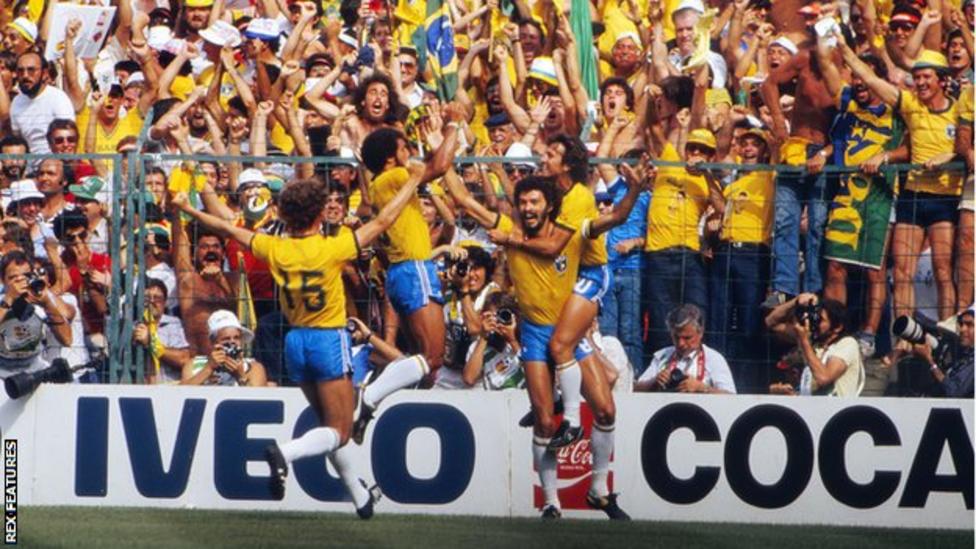
In November 2004, Brazilian football legend Socrates made a famous (and short) promotional cameo for English non-league side Garforth Town. As the football correspondent for a leading Brazilian newspaper, I arrived in the West Yorkshire town to write about the madness of it all.
An interview with the legendary midfielder – known as The Doctor because of his medical degree but also his political engagement – turned into a long after-hours chat at a local pub. Guards and notepads were down as Socrates, always a laid-back character, chatted about football with a sincerity that was remarkable even for him.
It was at that pub, such an unusual setting and so far from his comfort zone, that Socrates made a striking admission: he had never watched back Brazil’s 3-2 defeat by Italy in the 1982 World Cup – none of it. He just couldn’t bear to.
“I just don’t need to go through that game again,” he said. And it is quite likely that refusal remained until January 2011, when he died at the age of 57.
“That game” was a World Cup classic played on a hot Barcelona afternoon 40 years ago. One of the most feted generations of Brazilian footballers saw their dreams shattered by an Italian side that transformed over the tournament, putting a stuttering start behind them on the way to demolishing West Germany in the final.
With the passing of time, many older Brazilian fans have mellowed, but on 5 July 1982 the feeling was that a crime against football had been committed.
In 1982, Brazil was still ruled by the military regime that had seized power 18 years earlier, when left-wing president Joao Goulart was ousted in a coup.
Joao Figueiredo, an Army general, had become president in 1979 with the mission of overseeing a smooth return to democratic ways, but there were increasing calls for a faster handover during what was a turbulent time for the Brazilian economy.
It was in this context that Tele Santana was announced as the new Brazil football manager in early 1980. Santana had been a good player – a winger who scored 164 goals in nine years with Rio de Janeiro side Fluminense. He still ranks as their fourth-highest scorer.
Santana also built a reputation for fair play. He had never been sent off in his 12-year professional career. He demanded the same attitude from his players.
Qualifiers for the 1982 World Cup in Spain started with scrappy 1-0 and 2-1 away wins over Venezuela and Bolivia, but Brazil soon hit an impressive stride in the home games, beating the same opponents 5-0 and 3-1. In a May 1981 European tour, they raised eyebrows by beating England, France and Germany in the space of a few days.
But Brazil were doing more than winning. They were playing a fluid game that could not have been more different to the tactically disciplined style that had infuriated fans in the post-Pele era.
The exploits of Pele and Brazil at the 1970 World Cup had seemed like a long forgotten dream during uninspired campaigns in the two following tournaments, despite the team finishing in the last four on both occasions.
Now, as well as Socrates, the Selecao had Zico, the mercurial Flamengo playmaker, pulling the reins. Theirs was a flowing brand of football where no player seemed to touch the ball more than twice before passing it round. It was great to watch and, according to Zico, it felt even greater to play.
“We were adamant Brazil had to abide by the style that had made it famous. It would be wrong from the start to be scared of losing or to be a hostage of the result,” he says.
“We wanted to enjoy what we were doing. We felt that something really special was going on.”
So did millions of Brazilians. In the streets, bunting was going up as if in preparation for a royal wedding or a coronation. At a time during which Brazilian players were mostly plying their trade domestically – Roma’s Falcao a rare exception – you might bump into an international star on a trip to a Rio supermarket.
“Supporters would never hold back from giving us an earful, but at least they identified with us because we were all playing in Brazil at the time,” Zico says.
“These days players pretty much jump on a plane and fly abroad almost immediately after they play with the national team in Brazil.”
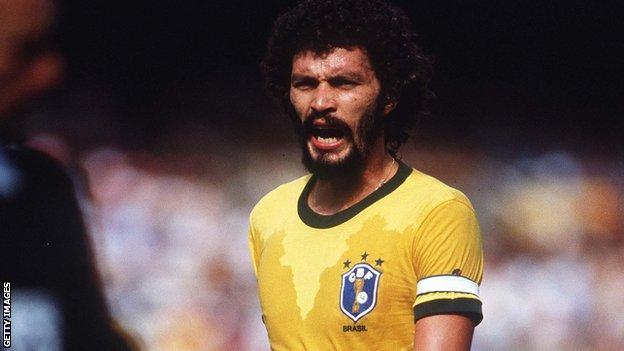
Expectations around the team were understandably high, and in Spain Brazil opened their World Cup campaign with a dramatic 2-1 win over the Soviet Union before thrashing Scotland 4-1 and New Zealand 4-0.
The tournament started with 24 teams in six groups of four. The six group winners and runners-up went through to a second group stage. The four winners of those groups of three would contest the semi-finals.
Brazil found themselves in the company of regional rivals Argentina and an Italy side that had drawn all three of their first-round games, barely making it out of a group that featured Poland, Cameroon and Peru.
Italy’s build-up to the tournament had been defined by the situation surrounding striker Paolo Rossi. In 1980 Rossi was involved in a match-fixing scandal and his two-year suspension ended only eight weeks before the start of the World Cup. Manager Enzo Bearzot nonetheless included the Juventus striker in his squad.
Coverage in the country’s media and the attitude of fans made for a sombre mood when they lined up to play Argentina on 29 June. Ninety minutes later they had won their first match in Spain. When Argentina were then put to the sword by Brazil in a blistering 3-1 win, the scene was set for a decisive showdown between two playing styles that couldn’t be more contrasting.
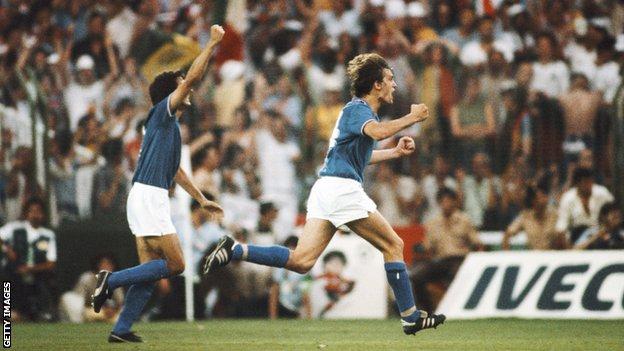
“You play there. Is there anything you want to say?”
Santana fired this question at the end of a team talk in Barcelona. Falcao was already anxious about the winner-takes-all game to be played against Italy at Espanyol’s now demolished Sarria stadium.
The Roma midfielder would be facing well-known opponents, and he feared his Brazil team-mates had the wrong idea about the real danger they presented, because of their stumbling start.
When prompted by the manager, Falcao expressed his worry about the possible role of Italian left-back Antonio Cabrini, a skilful player who was quite handy in attack. And that defender Claudio Gentile would probably stick to Zico like glue, aiming to repeat what he had achieved against a certain Diego Maradona in the previous game.
Italy’s was a style of play that could be placed in total opposition to Brazil’s adventurous commitment in attack. They knew how to close down and counter opponents – victory over Argentina showed it, a victory that revitalised them – but they would need to fire up front, too, in order to overcome the Brazilians. And their main striker Rossi had yet to score in the competition.
“That Brazil side wasn’t from this planet,” Rossi told me in 2006. “It had players who could pass the ball blindfolded.
“As for me, it just felt I was learning to play again after the suspension.”
In the Brazil camp, the mood couldn’t be more different.
“Some of the lads were teasing me and saying it must have been quite easy to earn a living in Serie A,” Falcao says.
Defender Oscar would later remember that some players were already discussing the weaknesses and strengths of Poland, the opponents waiting in the semi-finals.
Brazil would qualify with a draw – for they had a better goal difference – but Zico recalls: “In the dressing room before the game, Tele (Santana) never told us to hold back. Our commitment was always to go for the win, that was the true Brazilian way.”
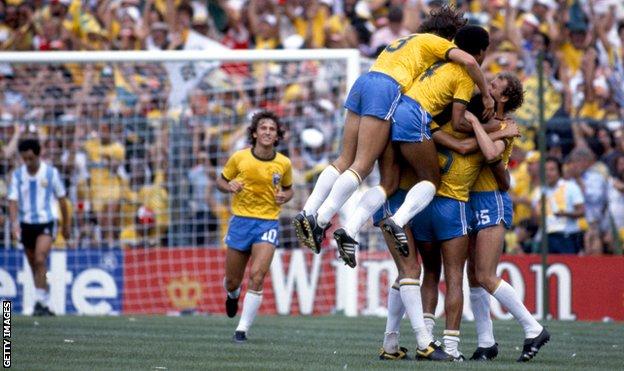
Much of the crowd in Barcelona had not yet even found their seats when Cabrini whipped a cross and Rossi headed in. With five minutes gone, Italy were 1-0 up and Rossi had broken his duck.
Brazil hit back shortly after through Socrates, but fell behind again in the 25th minute when Rossi latched on to a woeful loose ball in the Brazilian backline. When they equalised once more in the 68th minute, Falcao’s screaming celebration was not only a reflection of joy but also the urgency of almost choking on his chewing gum.
At 2-2, Brazil had the result they needed to progress. But with a little over a quarter of an hour to go, from an Italian corner won against the run of play, Rossi got his hat-trick. Israeli referee Abraham Klein then wrongfully disallowed another Italian goal for offside before blowing the final whistle on what would be forever known in Brazil as the “Sarria Tragedy”.
Its legacy can be seen in the more pragmatic and physical styles that would become more popular in the country over the next generation. When Brazil beat Italy on penalties to win the 1994 World Cup, nobody could say they played with the same swagger.
Italy, meanwhile, followed the upset in Barcelona by beating Poland in the semi-finals with a Rossi brace before winning their third world title by overcoming West Germany in Madrid. The formerly disgraced striker, who died in 2020 at the age of 64, also scored in the final (3-1) and took home the Golden Boot.
“We were obviously saddened by the result against Italy but everybody had clear consciences,” Zico recalls.
“There is nothing wrong in losing with dignity, it is a part of the game. The Selecao was going home but we had stood by our convictions until the end.”
Falcao, who observed the 20th anniversary of the match by publishing a book of recollections of the 1982 campaign, also puts on a brave face when looking back.
“That team lost that game but won a place in history. I am grateful to have been part of one the greatest World Cup matches,” he says.
But some of the team felt defeat more deeply, few people more so than Socrates.
Twenty-two years after the events in Barcelona, on a cold night in West Yorkshire, he was still struggling to come to terms with it.
“We had a hell of a team and played with happiness,” he said, barely raising his eyes from the pint glass he was holding.
“Then Rossi had three touches and scored a hat-trick. Football as we know it died on that day.”
Reports /TrainViral/
You may like
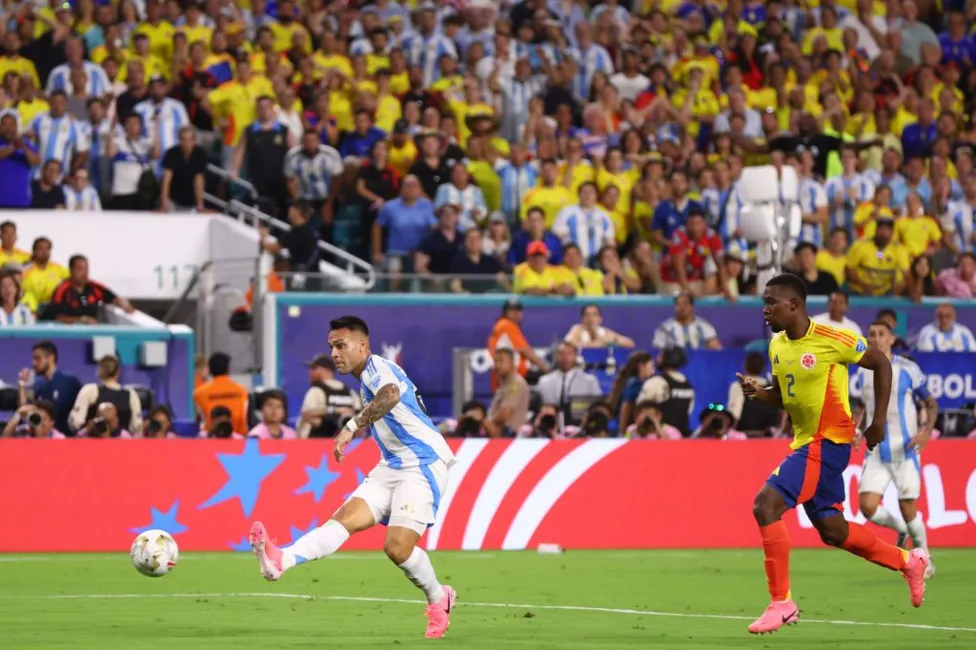
Argentina beat Colombia to win a record 16th Copa America but the game was marred by the kick-off being delayed by 80 minutes because of trouble outside the ground in Miami.
Lautaro Martinez struck in the second half of extra time from Giovani lo Celso’s through ball to secure the win.
Captain Lionel Messi was left in tears when he had to be replaced midway through the second half after injuring himself while chasing for the ball – but was celebrating his country’s third successive major tournament at the final whistle.
Kick-off was delayed because of chaos outside the Hard Rock Stadium.
Organisers said ticketless fans tried to get into the ground, leaving some fans waiting for hours in the Miami heat for the gates to open.
Fans and police officers and security clashed with several arrests made. Several supporters needed treatment from paramedics.
On top of that the half-time break lasted for 25 minutes because of a concert by Colombian popstar Shakira on the pitch, a move that was criticised by Colombia boss Nestor Lorenzo beforehand.
It was a game of few clear chances in hot, humid conditions, with Colombia’s Jhon Cordoba hitting the woodwork in the first half.
Argentina thought they had taken the lead with 15 minutes to go but Nicolas Tagliafico’s effort was ruled out for offside.
Martinez would end up as the hero – and win the Golden Boot with five goals.
What now for Messi after Copa America glory?
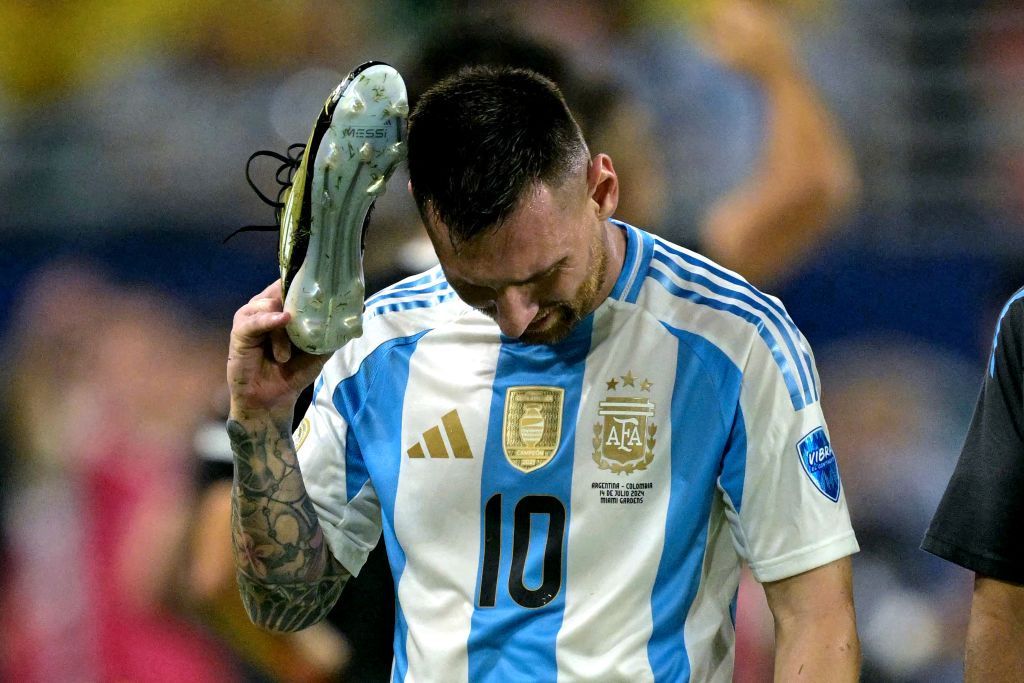
Lionel Messi went off injured in the second half
Messi had never won a senior international tournament until the age of 34 and now he has won three in three years after the 2021 Copa America and 2022 World Cup.
The final was played at the Hard Rock Stadium in Miami – which is just over 20 miles from the city of Fort Lauderdale, where Messi’s Inter Miami club play.
The 37-year-old said before this tournament he had yet to make a decision on whether he will play on for his country until the next World Cup, which is also in the US – as well as Canada and Mexico.
His powers seem to be waning and his only goal of the tournament came in the semi-final win over Canada. He missed a penalty in the quarter-final shootout against Ecuador.
In this game he was hurt by a tackle in the first half and hobbled off in the second period, holding an ice pack on his ankle on the bench.
Is this his final major tournament appearance of a legendary career?
It was certainly the final appearance of Angel di Maria’s international career. The 145-times capped player had already announced he would retire from the international stage after this.
Trouble before the game
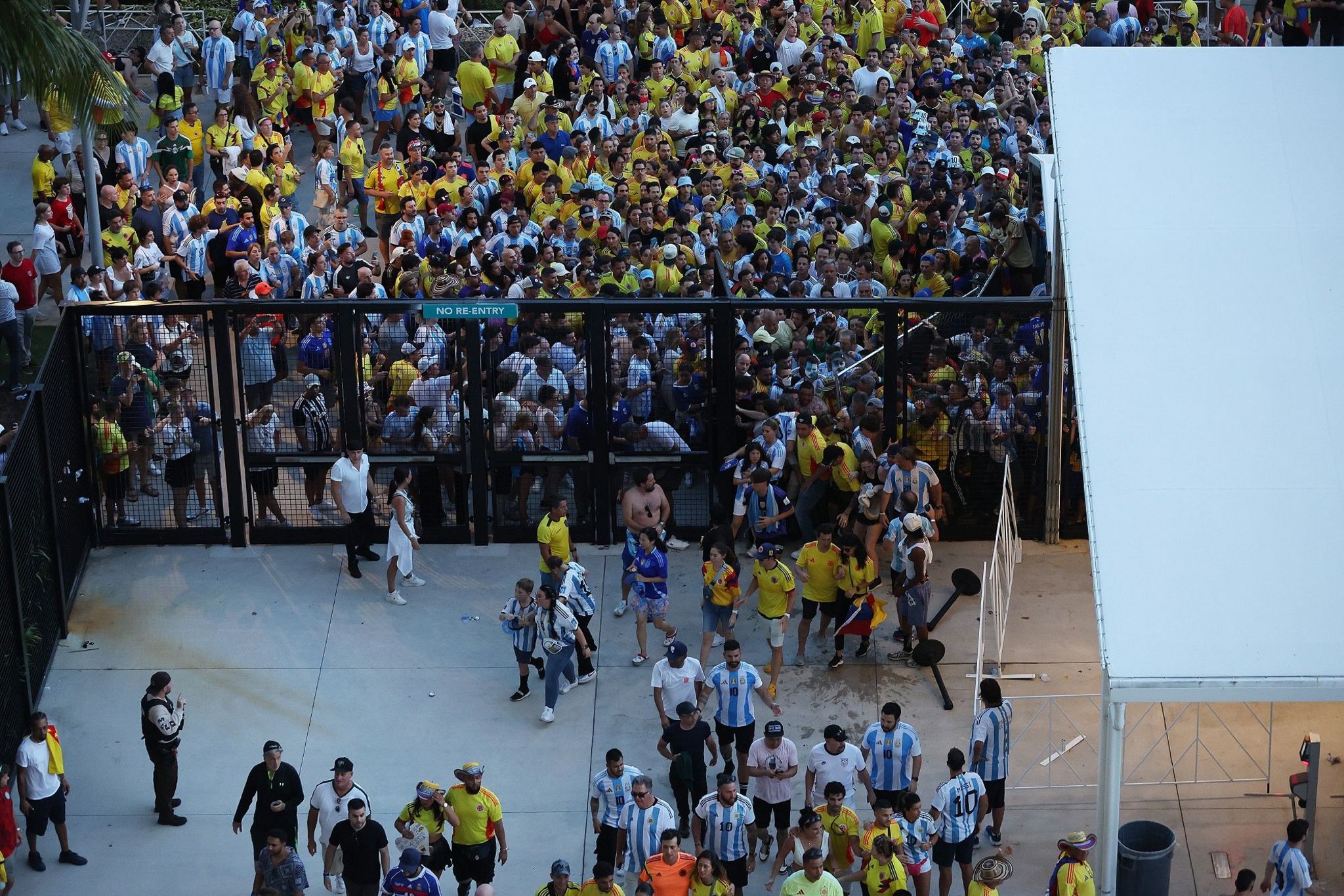
There were problems getting fans into the ground for kick-off
The delays before the game were more bad news for organisers – with the Hard Rock Stadium due to host games at the 2026 World Cup.
In the semi-finals in Charlotte, Uruguay players clashed with Colombia fans after the final whistle – because they were worried about the safety of their families.
Players’ families were affected too in Miami.
Roberto Garnacho, brother of Argentina winger Alejandro Garnacho, wrote on social media: “What a shame CONMEBOL, the families not being able to enter the stadium, unbelievable.
“We were with [Argentina defender Marcos Acuna’s] family outside, getting away from the fights… Argentina’s security had to come get us, children of players crying, people entering without tickets.”
Colombia’s wait goes on
Colombia had been unbeaten in 28 games, a run stretching over two years going back to a World Cup qualifier against Argentina.
But their only Copa America triumph remains the 2001 success in their home country.
They had chances against the Argentines, most notably when Cordoba hit the post early on with a hooked volley.
Writtes /BBC/
Reports /Trainviral/
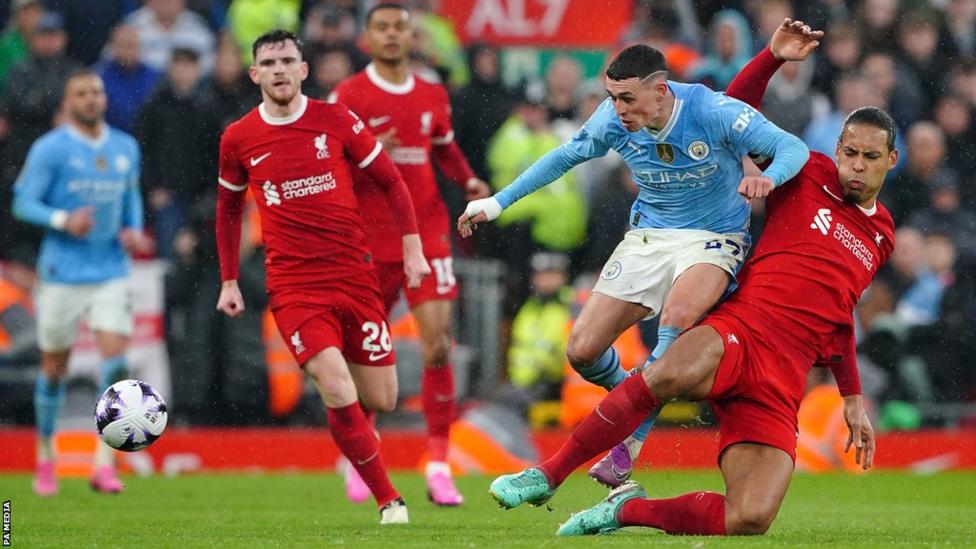
I know from my own experiences as a Liverpool player that, when you are losing at Anfield then equalise straight after half-time, it does more than give you momentum – it can change the whole feel of a game.
That is what exactly what happened in Sunday’s draw with Manchester City. As soon as Alexis Mac Allister’s spot-kick made it it 1-1, Liverpool put on a real powerhouse performance and they looked like they would go on to win.
Their work ethic, tenacity and intensity in the second half was incredible and It was Darwin Nunez who helped instigate that, firstly by winning the penalty for their equaliser.
Yes, it was a mistake by Nathan Ake, whose poor backpass let him in, but Nunez was switched on and ready for it – and he did not stop there.
Lots of Liverpool players did well after the break but Nunez was the one who really made the difference when they were on top. Like so many other teams this season, City struggled to cope with his physicality and all-round play.
I really do believe his display was as good as any I’ve seen from him since he joined Liverpool in the summer of 2022, which is a strange thing to say about a striker who didn’t score.
I loved his energy and his willingness to run without the ball, hassling City’s backline and stretching their defence, but he also showed great quality with it too. He slipped Luis Diaz in for one of his big chances and was involved in almost all of them in some way.
Nunez was unselfish with so much of his play but he was also unlucky not to get a goal himself when he got a toe to Andy Robertson’s cross. City keeper Stefan Ortega made a great save and, on another day, that goes in.
- Liverpool and Man City fight out pulsating draw
- Relive Liverpool’s thrilling draw with Manchester City
- Who will win the Premier League title?
‘Van Dijk is the one player Liverpool cannot afford to lose’
You don’t get anything against City without defending well too, and I was also really impressed by that side of Liverpool’s performance.
I expect a lot of Reds fans were nervous when they saw the teamsheet before the game, because out of their first-choice back five – including goalkeeper Alisson – only Virgil van Dijk faced the defending champions.
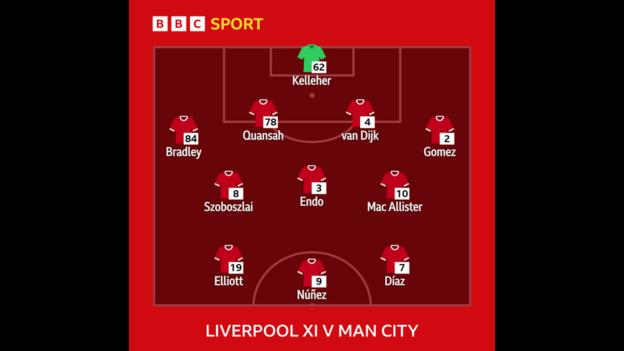
Ibrahima Konate’s injury this week meant the whole right side of Liverpool’s defence was very young, with Jarell Quansah next to Conor Bradley. Jurgen Klopp again showed his faith in the kids by playing them, and they both did really well in what was arguably the biggest game of their careers.
It was another example of the brilliant togetherness and belief that has got Liverpool so far this season, and kept them in this title race, and in with a chance of winning four competitions despite being affected by so many injuries.
By that I mean, when the chips are down and some big players are not around for the big games, they do not falter or feel sorry for themselves.
They also don’t sit back, whoever they are playing. One of the big strengths of this team is they don’t change they way they play even when some star names are missing – and still look to play on the front foot.
At the heart of it all, though, is Van Dijk. Some of his passing against City was phenomenal, as always, but on top of that, his last-ditch defending was outstanding.
There was the one-on-one with Erling Haaland where he stayed calm and in control, a crucial far-post header from a Bernardo Silva cross and an important block to deny Phil Foden.
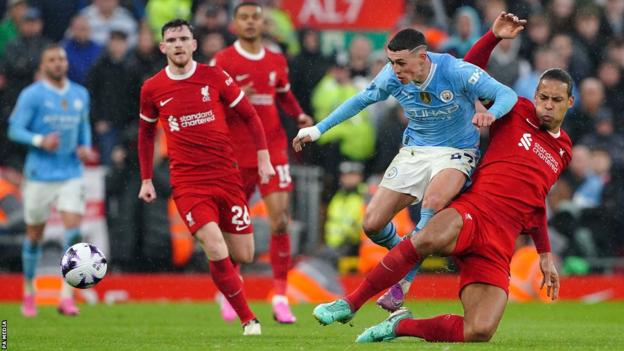
It was a monumental performance, exactly when it was needed, by a guy who was surrounded by several players who had not played in an occasion like this before, and one that some people viewed as a title decider.
Van Dijk has been terrific all season, of course, but this particular game showed the importance of his presence.
Konate could miss a couple of games and Liverpool will be fine. Trent Alexander-Arnold and Robertson have been out for several weeks already, and the biggest compliment I can pay to Caoimhin Kelleher is that he never looks like a back-up goalkeeper when he replaces Alisson.
Klopp has also got the numbers to rotate in midfield and all the front players have had injuries at some point this season. But, at the moment, Van Dijk is the one player they cannot afford to lose.
That’s how important he is to their title hopes, and where their whole season goes from here.
Why the run-in will be a rollercoaster ride
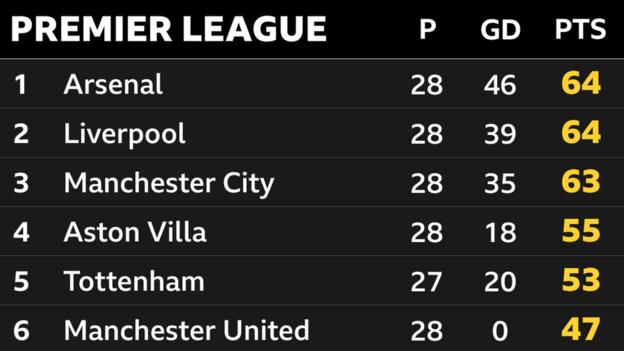
Sunday’s game was a brilliant watch, with such quality on show from both sides.
If Diaz had taken one of his chances then, with the Anfield crowd and the momentum Liverpool had at that stage, I feel like they would have probably seen City off.
Credit to City, though, because they hung in there and had a couple of excellent chances in the second half themselves.
Jeremy Doku hit the post after Kelleher had denied Phil Foden at a really crucial time and, for all the opportunities Liverpool created, they could still have been beaten.
When the dust settles, I think they will be content with the result – they have now played and drawn with City twice in the Premier League, and they are still a point ahead of them with 10 games to go.
Liverpool could soon be in an even stronger position, because City play Arsenal in their next league game, on 31 March. At least one of their title rivals will drop points then, but it would be naïve to think that game will decide anything.
We have got three brilliant teams in this title race, who have all got great strength in depth. But I am not convinced any of them will go on from here and win every game in the run-in, which Liverpool and City have both done in previous seasons, because they have all appeared a bit vulnerable at times.
Look at Arsenal – they have been on this amazing goalscoring run but they still needed Aaron Ramsdale to make a couple of great saves in their win over Brentford on Saturday, and had to wait to score a late winner.
There were some nerves involved in their performance, inevitably, and there are plenty more of those to come.
The one team you would not expect to suffer in that way, emotionally, are City because of what they have been doing for so many seasons now. But I still expect it to be a rollercoaster ride for all three teams and it would not surprise me if they are all still involved with a couple of games to go.
It is going to be fascinating to watch it unfold, whoever you support. Even if you have a fondness for one of the teams, every football fan loves watching close competition with jeopardy involved.
— Reports /TrainViral/
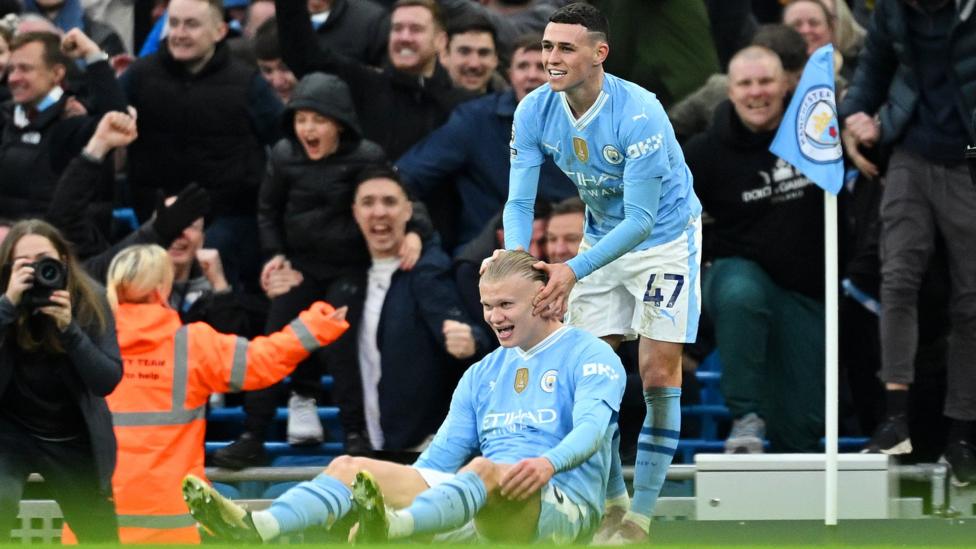
Manchester City boss Pep Guardiola said after Sunday’s Manchester derby that midfielder Phil Foden was the “best player in the Premier League right now”.
And Foden has a strong case for that accolade, having scored six goals and provided an assist in his past seven league games.
Using the past 10 rounds of Premier League matches, BBC Sport look at who might currently be its ‘best’ player.
Phil Foden (Manchester City)
Foden scored twice in a 3-1 win over Manchester United on Sunday as City stayed firmly in the hunt for the title.
The 23-year-old has scored 11 Premier League goals this season and assisted seven – putting him joint-eighth in the rankings for those categories.
Guardiola: “What can I say? He is the best player in the Premier League right now for the amount of things he does. Unbelievable.”
BBC Radio 5 Live commentator John Murray: “If England were playing their first match at the Euros later today, I think you would expect to see Bukayo Saka on the right, probably Phil Foden on the left, Harry Kane through the middle and Jude Bellingham in the number 10 position.”
Erling Haaland (Manchester City)
Haaland tops the Premier League goalscoring charts on 18 – two clear of everyone else. That is despite missing five matches so far this season.
Having featured in City’s past seven games since returning from injury, Haaland has scored four league goals and set one up in that time, as well as hitting five goals in an FA Cup fifth-round victory at Luton Town.
Guardiola: “With top scorers or strikers who score a lot of goals, don’t criticise because he will shut your mouth, that’s for sure.”
Former City midfielder Michael Brown: “He’s got that power, he’s got that dedication. That hunger to finish. We’ve seen him mix up his goals. It’s difficult to just not let him do what he does.”
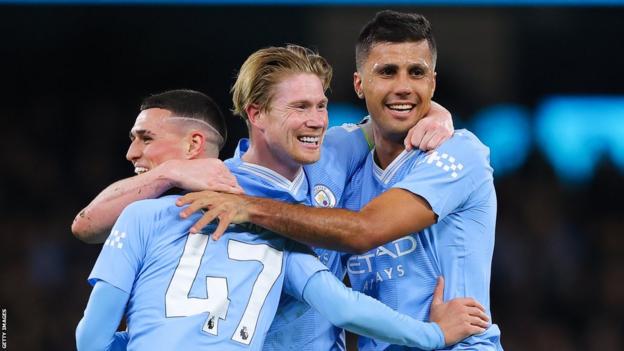
Kevin de Bruyne (Manchester City)
City midfielder De Bruyne has been in superb form since returning from a hamstring injury which meant he missed the first five months of the season.
He has scored once and claimed four assists in seven league games, despite only starting four of them. He also got four assists in the FA Cup win at Luton.
Guardiola: “He is a special player. He is a legend.”
Former City defender Micah Richards: “We talk about lots of players being world class but Kevin is different. He always seems to gauge exactly what the game needs – and he delivers, all the time.”
Rodri (Manchester City)
Rodri has always been capable of producing big moments when it matters – and the midfielder is on a 59-match unbeaten run in City colours.
Naturally a defensive midfielder, he has added more going forward of late, with three goals and three assists in his past 10 league games.
Guardiola: “He’s the best midfield player in the world currently by far because he is able to do everything.”
Luton Town captain Tom Lockyer: “It’s just a joy to share a football pitch with him. You don’t say that about a lot of players.”
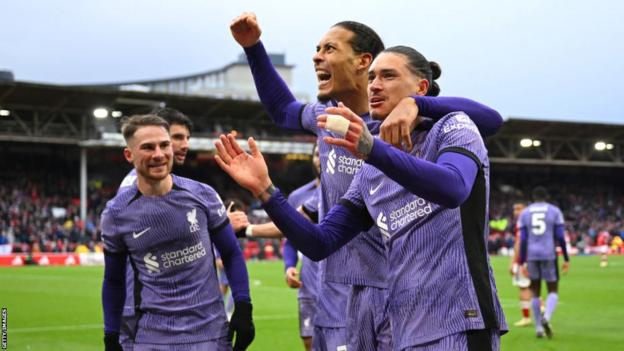
Virgil van Dijk (Liverpool)
Liverpool captain Van Dijk has been one of the few mainstays in a title-challenging Liverpool side blighted by injuries.
In the Reds’ past 10 league games, Van Dijk has scored once, helped keep three clean sheets and also scored the winning goal in last month’s Carabao Cup final against Chelsea.
Liverpool boss Jurgen Klopp: “Virgil van Dijk, from the first day since he stepped into Liverpool FC, is absolutely outstanding.”
BBC Sport journalist Luke Reddy: “Van Dijk has been a ‘colossus’ in recent weeks.”
Darwin Nunez (Liverpool)
Uruguayan striker Nunez has been in fine form for the Reds of late, and scored the last-gasp winner at Nottingham Forest on Saturday.
In Liverpool’s past 10 league games, Nunez has played nine, scoring six goals and getting an assist.
Liverpool assistant manager Pep Ljinders: “Each game, he can create six chances just by himself.”
BBC Sport chief football writer Phil McNulty: “I think Nunez has loads of ability and his stats alone tell you what an impact he has on games. Not one goes by where he does not have influence of some sort.”
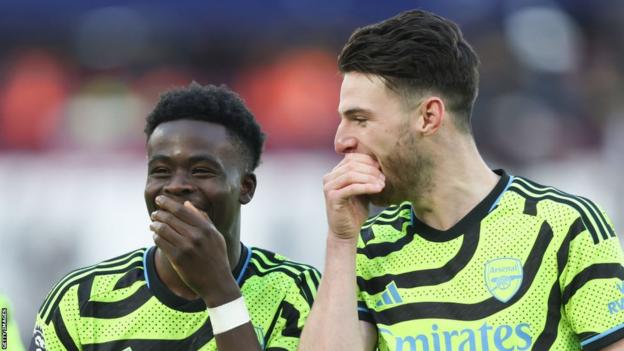
Declan Rice (Arsenal)
Since a British-record transfer to Arsenal in the summer, England midfielder Rice has been a key part of the Gunners’ title challenge this season.
Despite his defensive responsibilities, he has scored once and provided four assists in the Gunners’ past 10 league games.
Former Manchester City midfielder Michael Brown: “Declan Rice can do every bit of being an all-round midfielder.”
BBC Sport football reporter Simon Stone: “I am a huge Declan Rice fan and he could turn out to be the difference between Arsenal fading away in the title race, as they did last season, and really going for it.
Bukayo Saka (Arsenal)
A strong contender for the Premier League’s most in-form player is England winger Saka.
In his past 10 league outings, Saka has scored eight goals, including two apiece against West Ham and Burnley, and added an assist.
BBC Sport football reporter Simon Stone: “[The best player in the league] is between four – Haaland, De Bruyne, Salah and Saka. Whoever wins the title is the best.”
Former Chelsea winger Pat Nevin: “There were plenty of players who caught the eye in Arsenal’s win at Turf Moor, but Bukayo Saka being back close to his best was as important as anything else.”
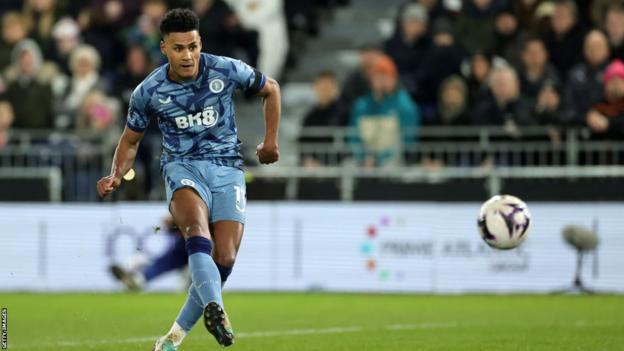
Ollie Watkins (Aston Villa)
Watkins is a player who can go under the radar but is certainly a contender. He is ranked top for direct goal involvements and joint-top for assists this season.
In Villa’s past 10 league games, he has seven goals, four assists and is the only player to pass into double figures in both categories this season.
Aston Villa manager Unai Emery: “His commitment is brilliant and the consequence is this when he works hard every day.”
Former Newcastle and England striker Alan Shearer: “He’s having the season of his life. The form he is in, he is not hoping to score, but expecting to score.”
Cole Palmer (Chelsea)
One of the few bright sparks for Chelsea this season has been midfielder Palmer. He has scored four times and provided the same number of assists in the Blues’ past 10 Premier League matches.
Chelsea manager Mauricio Pochettino: “He is an important player for us. He is a decisive player. I am so pleased with him.”
Manchester City manager Pep Guardiola: “It is not just goals and assists, it is the quality. He is an incredible threat for Chelsea.”
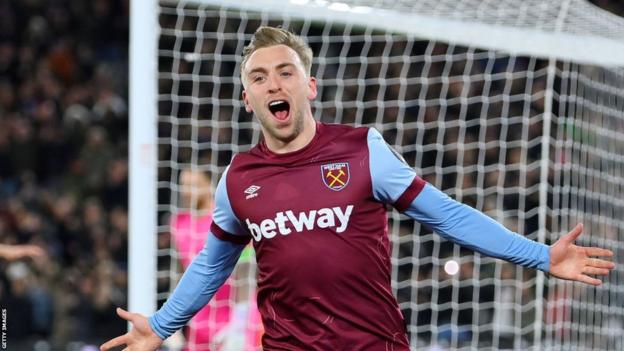
Jarrod Bowen (West Ham)
West Ham winger Bowen is having his best ever Premier League scoring season. having netted 14 times so far.
In the Hammers’ past 10 league matches, Bowen has scored five goals and provided two assists – including his first career hat-trick against Brentford.
West Ham United manager David Moyes: “Some of his performances recently have gone unnoticed because we haven’t won.”
Former Manchester United and England midfielder Paul Scholes to TNT Sports: “You can see Real Madrid, Man City, Arsenal all wanting him. He is a unit and reminds me a bit of Eric Cantona.”
Alphonse Areola (West Ham)
A left-field shout, but from a numbers perspective it is hard to ignore Areola.
In the past 10 games, he’s kept three clean sheets and averaged 5.8 saves per game. He also has the highest save percentage in the Premier League, has made more than 100 saves, conceded four fewer goals than his expected goals against tally suggests he should have, and is the only goalkeeper to save multiple penalties so far this season.
West Ham manager David Moyes: “Our goalkeeper played brilliantly well. He made several saves today that probably stopped Everton getting a result.”
And the rest…
Among those to narrowly miss out are forwards Diogo Jota (Liverpool), Mohamed Salah (Liverpool) and Rasmus Hojlund (Manchester United) – all overlooked because of recent injury issues.
Honourable mentions also go to John Stones (Manchester City), Douglas Luiz (Aston Villa), Ross Barkley (Luton Town), Rodrigo Muniz (Fulham), Caoimhin Kelleher (Liverpool) and Heung-min Son (Tottenham Hotspur).
- Big laughs and top quality content with Elis and John: Join the UK’s youngest and most relevant broadcasters
- Can three million people disappear from public memory? This is the story of the Bengal Famine of 1943
- — Reports /TrainViral/

Father of five blasted for leashing kids, gives them odd nickname

This heartwarming prom story goes viral again and we all understand why

Simon Cowell Won’t Leave Son His $600 M Fortune; Says If He or Future Children Wants to “Start a Business … I’ll Invest. They Aren’t Getting Trusts”

Five wedding outfits for just £29!

Mikhail Gorbachev changed history

Tracking the war with Russia
Trending
-

 Fashion2 years ago
Fashion2 years agoFive wedding outfits for just £29!
-

 Politics2 years ago
Politics2 years agoMikhail Gorbachev changed history
-

 Politics2 years ago
Politics2 years agoTracking the war with Russia
-

 Everything About Youtube2 years ago
Everything About Youtube2 years agoThe Twitter Artist who makes a Fortune off YouTube Thumbnails while Studying.
-

 Fashion2 years ago
Fashion2 years agoOn presents first ever shoe made from carbon
-

 Politics2 years ago
Politics2 years agoCharles is announced to be the new King
-

 Everything About Youtube2 years ago
Everything About Youtube2 years agoEveryone knows YouTube, but not how it works.
-

 Tech2 years ago
Tech2 years agoThe rise of the AI artists stirs debate

